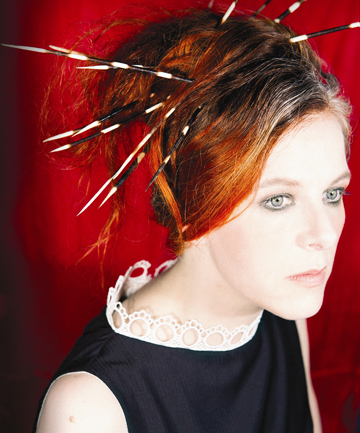
Like many people who’ve gone through involved lives that now infuse their art, the magnetic singer- songwriter Neko Case has a few theories about matters pertaining to herself such as playing concerts, something she has done thousands of times, and connecting with an audience.
“There are times I can’t hide what I’m feeling at a show, so I find it best to say, ‘Hey, I’ve had a terrible day’, or ‘I’m a little bit distracted because my dog is currently having surgery in a different time zone’. People appreciate you when you say that,” Case says.
“There’s supposed to be this solid line between the band and the audience, and a lot of popular music looks very expensive and completely unobtainable,” she adds. “It doesn’t have to be that way. If people want to play air guitar to our band, that’s awesome.”
On her inventively tender and yet fiercely direct 2013 album The Worse Things Get, the Harder I Fight, the Harder I Fight, the More I Love You, Case catches the thrill of desire (City Swan) and the pain of parental rejection (Nearly Midnight, Honolulu) with equal dexterity and honesty.
It’s a record that acknowledges our complexities, how they engulf us at one point and elevate us at the next. Life, notes Neko Case, “is a strange and wonderful organic relationship with other humans”.
Case, who has a parallel membership in the successful Canadian indie group the New Pornographers, says this as she packs for a European tour that will start in Helsinki, Finland. She lives with dogs, cats, chickens and a horse in a farmhouse that is more than 200 years old in Lamoille County, north-east Vermont. The sizeable property, amid bucolic farmland, has been her home for eight years and Case values it dearly.
“There’s a certain point where you say to yourself, ‘No, no, no – I will live somewhere or I will go crazy’,” she says.
The first of six Neko Case studio albums, The Virginian, came out in 1997, and members of her touring band, including Kelly Hogan and Jon Rauhouse, have been with her since some of her earliest tours, when she couldn’t pay them enough to cover their rent. They stuck with her because they loved her music.
“Now they pay their rent and still love the music,” says Case, whose 2009 album Middle Cyclone debuted at No 3 on the American charts. That record kept her on the road for almost two years and, along the way, she lost a grandmother she was close to, and then both her parents, who she was not. Still, their passing left her with complicated emotions that calcified into a lengthy bout of depression.
Ad Feedback
On The Harder I Fight Case remembers those long months on Where Did I Leave That Fire, where she sings about how, “I wanted so badly not to be me”.
The song has become a touchstone for album reviews and Case’s personal struggles, to the point where you wonder if her feisty openness is leaving her exposed.
“On one hand, I don’t like to talk about myself, because it’s really not that interesting; on the other hand I don’t want to lie about anything,”she says. “It’s not a bummer that people want to know, I’ll put it that way. I don’t ever push the table over and yell, ‘This is an outrage!’ ”
Case puts her life into her music, and on the whole, music is her life. But while she’s proud of what she’s achieved, she doesn’t want to cloak it in mystery.
“I work very hard because that’s all I do. I don’t have a family per se, and I’m not complaining because that’s totally my choice, so since this is the life I’ve chosen, then I want to do an exceptionally good job,” she says.
“If people feel comforted by the music, or feel that it enriches their lives, or just want to see me and my band live and have fun on a Saturday night, I take pride in that.”